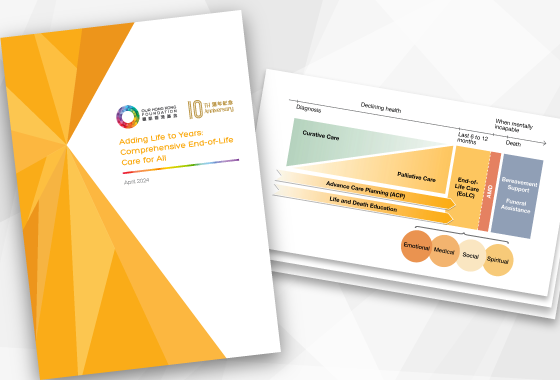With a budget deficit, Hong Kong needs to optimise healthcare spending
This article appeared originally in South China Morning Post on 14 Mar, 2024.
Authors: Dicky Chow, Head of Healthcare and Social Innovation, Dorothy Yeung, Assistant Researcher at Our Hong Kong Foundation
- Officials need to reimagine healthcare financing by focusing on strategic purchasing
- This approach is about more than just saving money; it is a resource allocation philosophy that demands thoughtful procurement decisions and which can boost primary healthcare

Following the release of the latest Hong Kong budget, it’s worth taking a deep dive into the city’s fiscal dynamics and healthcare financing – and challenging the perception that healthcare must always be a significant financial burden.
With the government likely to face constraints in implementing any extensive healthcare measures due to the budget deficit, we should direct attention towards enhancing the efficiency of existing services and plans.
Healthcare underfunding ultimately leads to higher costs. The pressure on hospital stays and emergency services, and the ripple effects of an under-resourced healthcare system serve as a wake-up call. We must recognise the importance of shrewdly investing in our healthcare system so it can flourish and help sustain Hong Kong’s development.
The city’s healthcare system, with its heavy reliance on public services, faces challenges in financing, service provision and maintaining an adequate workforce.
One effective approach outlined in the Primary Healthcare Blueprint is strategic purchasing, an approach endorsed by the World Health Organization. This involves more than just saving money; it is a resource allocation philosophy that demands thoughtful procurement decisions that reflect evolving health needs.
Strategic purchasing requires the government to consider the capacity of both the public and private sectors to allocate resources more effectively. This can help ensure the sustainability of healthcare services. As a tool, it can aid development of primary healthcare.
Investing in primary healthcare is crucial, as chronic diseases and complications arising from them could pose an increasingly heavy burden on our healthcare system. The cost of managing diabetes alone from 2022-2051 could be up to HK$45 billion (US$5.7 billion). But effective diabetes screening and management could save 28 per cent on direct medical costs over the next 30 years.
By focusing on prevention and early intervention at the primary level, we can reduce demand for healthcare at source, resulting in significant savings.
The Chronic Disease Co-Care Pilot Scheme, which matches middle-aged Hongkongers without a history of diabetes or hypertension with family doctors at subsidised rates for screenings and consultations, exemplifies the preventive approach using strategic purchasing.
Within two months, more than 17,300 people have joined the scheme, with nearly one in 10 diagnosed with diabetes or hypertension, requiring community teams to follow up.
For the scheme to flourish, a two-way feedback mechanism involving healthcare practitioners and patients is indispensable. Regular feedback will help refine and improve the programme. A thorough analysis of cost-effectiveness can also show the long-term financial prudence of such preventive care strategies.
By using the knowledge gained from the scheme, the government can enhance and promote strategic purchasing, which should become the blood running through the veins of the healthcare system.
For instance, Hong Kong’s first Chinese medicine hospital is due to open next year, a showcase of collaborative efforts between Western and traditional methods, and the government plans to release its blueprint for the development of Chinese medicine in 2025.
Strategic purchasing could help officials identify how best to allocate resources in integrating Chinese medicine into the healthcare system. The government-funded hospital is, for instance, expected to work closely with the private sector. Traditional Chinese medicine, with its emphasis on preventive care, is a natural fit for the developing primary care sector.
Hong Kong has been also grappling with a shortfall in healthcare professionals, especially in psychiatric care, where people may have to wait up to 95 weeks for support in the public healthcare system. To address this, strategic purchasing could help provide training for community care workers and counsellors to provide non-medical support.
This could shift some of the care burden from hospitalisation to early intervention and ensure people who need psychological or psychiatric support receive timely help in their local communities.
By widely implementing strategic purchasing, the government can better establish public-private partnership programmes to craft a more cost-effective and robust healthcare system. We need a mindset shift to start seeing resources invested in primary healthcare as a judicious investment rather than a draining cost.
Hong Kong needs to acknowledge the need to reimagine healthcare financing. By harnessing the wisdom of strategic purchasing, we can build a healthcare system that delivers cost-effective and optimal outcomes while safeguarding the health and prosperity of our community for a thriving, resilient future.



